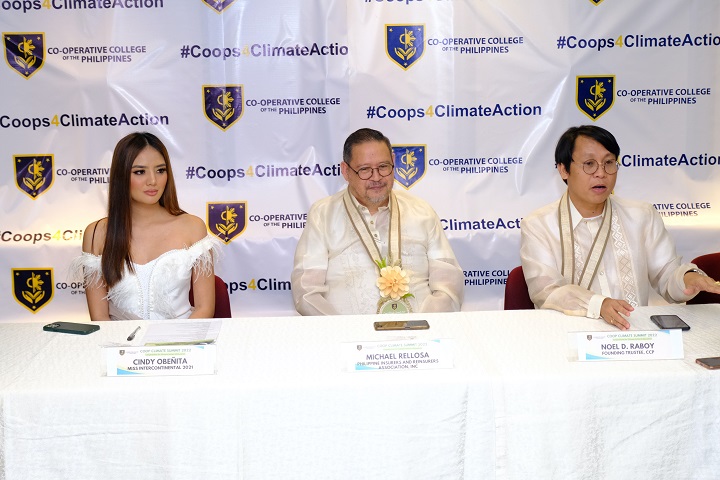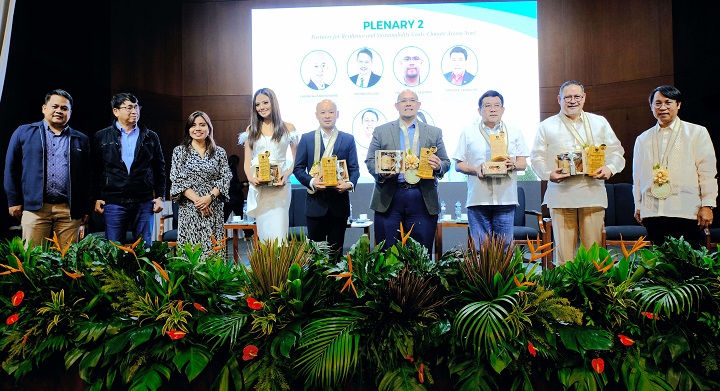
Last November 23, the Co-operative College of the Philippines and CLIMBS Life and General Insurance Cooperative conducted the COOP Climate Summit 2022: Cooperatives for Climate Action & Education, hosted by Cindy Obeñita (Miss Intercontinental 2021) and moderated by Donna C. Dizon, the Co-operative College of the Philippines’ Principal and CEO.
The event was held at the Philippine International Convention Center in Pasay City, beginning with a press conference at 9:00 am, and centered around how government and private organizations contributing or implementing programs in the country can contribute to the mitigation of climate change and further the cause of climate justice, specifically in terms of supporting our essential but most vulnerable sectors.
The summit proper was divided into two plenary sessions, entitled Climate Change in the Philippines: Challenges and Responses, which were participated by representatives from PCIC, DA, CDA and CIAT and Partners for Resilience and Sustainability Goals: Climate Action Now! were personnel from PAGASA, PIRA, USAID, CLIMBS and Alpha Millennial shared their movements and plans to mitigate and combat climate change.
“It’s not enough to talk about the meaning and impact of climate change,” said Noel Raboy, Founding Trustee of the Co-operative College of the Philippines and President and CEO of CLIMBS, at the opening press conference. “As representatives of the cooperative sector, we cannot stress the importance of putting this summit together, and the conversations we will have after. [We] will give you our action—collective action, which is the only way to accomplish our mission of helping our members and their communities. We experience typhoons yearly and our farmers take the brunt of it; we need to be serious in our discussions about climate change in the Philippines, because these typhoons largely come from the Pacific [Ocean], meaning that the Philippines is the first line of defense for other countries [west of us]. We also need to demand compensation because we contribute very little to the emissions but [receive the consequences first and more harshly]—there needs to be a tangible form of justice, with the government’s help.”

“Of course, that’s the big picture, but there also needs to be grassroots support,” said Fr. Elmo P. Manching, Chairperson of the Co-operative College of the Philippines. “As [Mr. Raboy] stated, it’s about collective action—yes, we are all ‘responsible’, but the approaches are different. Some must be held accountable, but many more must be enabled to secure their futures sustainably; although the latter may contribute more help than harm, they feel the negative consequences in full force. That’s where [cooperatives like ours] come in; that is where cooperatives are key.”
In a prior release from CLIMBS, it was stated that by and large, and over many administrations, little help has been available to Philippine farmers, fishermen, and the thousands of essential but overlooked workers who constitute the economic and nutritional backbone of the country. What assistance has been extended, such as the free irrigation systems mentioned in Republic Act No. 10969 last 2017, tends to be temporary for lack of maintenance.
While bigger industries like tech, banking, and retail have the time, expertise, and resources not only to preserve themselves in a volatile market, but also to be able to address societal ills such as gender inequality and climate change, Philippine farmers have little to no access to credit, insurance, or any sort of financial asset outside of physical money. In fact, about half of Filipinos overall (44% as of 2021) report that they are not in possession of a bank account. Along with the effects of climate change, these sectors are the most at-risk, which in turn places the rest of the Philippines at an economic disadvantage on top of its geographic one.
Over the course of the event, the Co-op College of the Philippines and CLIMBS made clear its intention and plans to provide complete and comprehensive protection—with a goal of insuring 20 million Filipino lives by 2024 in the country’s most vulnerable sectors.
The summit was ultimately a call to action for corporate and government bodies to deliberately integrate moves towards climate action in as many endeavors as possible.


4 Comments
very interesting post.this is my first time visit here.i found so mmany interesting stuff in your blog especially its discussion..thanks for the post!
This is such a great resource that you are providing and you give it away for free. I love seeing blog that understand the value. Im glad to have found this post as its such an interesting one! I am always on the lookout for quality posts and articles so i suppose im lucky to have found this! I hope you will be adding more in the future…
An interesting dialogue is price comment. I feel that it is best to write more on this matter, it may not be a taboo topic however usually individuals are not enough to talk on such topics. To the next. Cheers.
I cannot wait to dig deep and kickoff utilizing resources that I received from you. Your exuberance is refreshing.